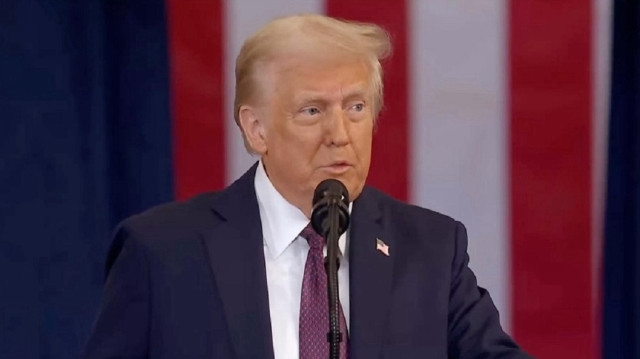
Uncertainty over how Trump administration will shape its policies toward key oil suppliers such as Russia, Iran, Venezuela continues to signal ongoing risk in oil market
Oil prices are declining as a result of new policies aimed at increasing fossil fuel production under US President Donald Trump, however, experts predict that regulatory changes targeting the sector will have a limited impact on the broader oil market.
On Jan. 20, when he took office, Trump signed several executive orders, including one declaring a National Energy Emergency to boost the country's oil and gas production.
He announced plans to withdraw the US from the Paris climate agreement and reverse the drilling bans on oil and natural gas in US waters imposed during the former Joe Biden administration. He also moved forward with a series of decisions aimed at unlocking Alaska's natural resources.
Trump also maintained his tariff threats against key trade partners, including Mexico, Canada, China, and the EU, in his initial statements. Although he did not present a specific plan on tariff policy, the prospect of heightened customs duties on these nations has raised concerns over global trade tensions.
He reiterated his warning that any attempt by BRICS nations to replace the US dollar would result in a 100% tariff on those countries. Last year, reports emerged that Saudi Arabia was considering the use of the "petro-yuan" in global oil trade with China.
Amid these comments, Brent crude, which had been on a downward trajectory throughout the week, posted its first six-day losing streak since October 2024. The price dropped by 2.9%, closing at $77.54 for the week ending Jan. 24.
- Trump's policies aimed at lowering oil prices might not align with market dynamics
Uncertainty over how the Trump administration will shape its policies toward key oil suppliers such as Russia, Iran, and Venezuela continues to signal ongoing risk in the market, limiting further price declines.
On Jan. 10, the US Department of the Treasury announced it had added Gazprom Neft, Surgutneftegas, and their subsidiaries, along with over 30 Russia-based oilfield service providers, to its sanctions list. Following this development, Brent crude hit its highest price in three months.
Following Trump's return to the presidency, his policies, particularly toward Iran and Venezuela, are expected to have a significant impact on the oil market. Uncertainty over whether the US will reimpose its "maximum pressure" campaign against Iran and lift sanctions on Venezuela is expected to drive oil prices higher.
Trump's policies aimed at lowering oil prices do not align with the market dynamics in the sector, Jorge Leon, senior vice president of Norway-based consultancy Rystad Energy told Anadolu.
Leon emphasized that in the coming period, capital discipline and shareholder returns will take priority, while the true effects of deregulation might not be seen until next year.
"I believe the administration's ambitions may overestimate the industry's willingness to prioritize national policy objectives over investor-driven priorities, as well as the significance of Tier 1 inventory depletion in core gas basins post-2030," Leon said.
"Capital discipline and shareholder returns are likely to take precedence over the Trump administration's priorities for E&P management teams. The true impact of deregulation would be limited in the next year or so," he added.
Leon, noting that Trump's plans to boost domestic production through a National Energy Emergency declaration will have limited short-term impact, also pointed out that policies such as pressure on Iran and Venezuela, tariffs on Mexican and Canadian oil, and the end of EV (electric vehicle) mandates could drive oil prices higher.
- Aggressive production increase strategy is unlikely to have a significant impact on oil markets
According to Ajay Parmar, the director of Oil Markets and Energy Transition at Independent Commodity Intelligence Services, Trump's unpredictable policies are likely to bring more volatility to the oil markets. However, he noted that the impact of the regulatory changes on the sector will be limited.
Parmar emphasized that the continuation of sanctions on Russia will play a crucial role in determining the future direction of oil prices, adding that if Trump decides to lift sanctions on Russia, oil prices could quickly drop below $70.
Parmar also noted that the reimposition of sanctions on Iran would be another key factor influencing prices. Recalling that Trump imposed a series of sanctions on Iran in 2018, he warned that reinstating these sanctions could reduce Iran's oil supply by as much as 1 million barrels per day (bpd).
Suggesting that while this would lead to a rise in oil prices, the effect would likely be temporary, Parmar attributed this to OPEC+ currently holding over 5 million bpd in spare capacity.
"Trump will want oil prices to remain below $80 per barrel and is attempting to pursue this with his 'drill, baby, drill' approach to domestic oil supply. However, we believe his ability to influence the sector through legislative changes is minimal, as major players like ExxonMobil and Chevron now have a significant presence in the US shale patch," Parmar said.
"These companies are less reactive to legislative shifts and short-term price fluctuations, focusing instead on long-term, stable returns. Therefore, we think the 'drill, baby, drill' strategy will have no material impact on oil markets,” he concluded.
Hello, the comments you share on our site are a valuable resource for other users. Please respect other users and different opinions. Do not use rude, offensive, derogatory, or discriminatory language.
The floor is all yours.








